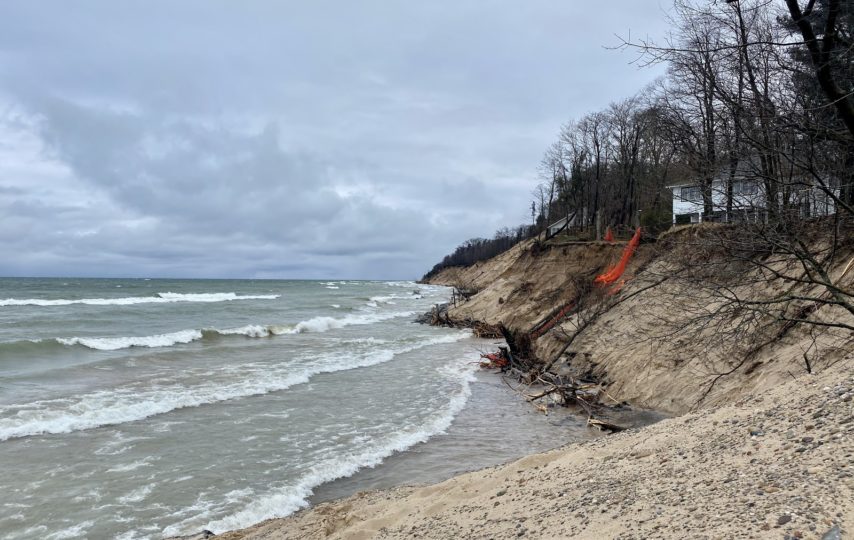There’s nothing better than enjoying your very own lake on your property. Unfortunately, shoreland properties are prone to erosion that not only devalues a home but also ruins the owner’s scenic views. How can you prevent lakefront erosion and why are lake erosion control methods important? Here are a few great tips and useful information about what lakefront erosion is and why it happens.
What Is Lakefront Erosion?
Lakefront erosion, which is also known as shoreline erosion, is what happens to shoreline after an extended period of time being battered by waves and water. It tends to happen most often to the shores of lakes and can be quite noticeable to those who own lakeside properties.
Erosion happens during calm and angry weather alike, with small particles of soil being washed into the body of water bit by bit on calm days. On rainy days or during storms, however, this process is amplified by rain drops and wind, which makes the water lap faster and more aggressively, taking with it more soil than usual.
As time goes on, the shoreline slowly crumbles away and disappears into the water. This results in shoreline properties diminishing and homes losing their value, as well as their appeal to the eye.
2 Reasons Not to Avoid Dealing with Erosion Damage
When you notice erosion damage starting, it can be easy enough to put off dealing with the issue. After all, it looks like an expensive problem. There are, however, a number of reasons why we’d encourage you not to put the problem off until a later date.
Prevention is easier than fixing.
The best way to fix erosion is to prevent it, as cheesy as that sounds. When you first notice erosion damage, consider putting into place a prevention plan. This will help you minimize the damage caused by any erosion that might occur in the future.
Legalities
Unfortunately, it’s illegal to rebuild shoreline once it has been eroded into dust. Don’t ask us why, because it doesn’t make any sense to us either but as the facts stand, you can be fined heavily for rebuilding lost shorelines.
This legality can be sidestepped by obtaining a permit. However, most agencies are reluctant to hand out said permits because, despite permits being available, they don’t want to give homeowners the permission they need to rebuild.
6 Lakefront Erosion Prevention Methods
Mind the Animals
Lakes are prime drinking spots for animals and, while dogs and cats don’t do too much damage to soil, larger animals such as deer and moose can cause quite a bit of an upset. Since they weigh so much, their hooves easily eat up the soil at the water’s edge, aiding the erosion.
If you can, try to keep animals away from your shorelines in order to avoid making any existing erosion problems worse.
Swap out Your Soil
If you’re noticing a lot of erosion, consider what type of soil your shoreline is composed of. This is important because certain types of soil – such as sandy soil- are more prone to erosion since they tend to be less structurally stable and sound.
You may want to swap out your soil or consider adding more suitable soil to your shoreline before it completely erodes and you’re left wondering how to replace your shoreline legally. Add soil that consists of a large amount of clay to ward off water damage.
Utilize Rip-Rap Rock
“Rip-rack rock” is a term used to describe a collection of stones and rocks that vary in size and shape. Granite, small boulders, river rock, fieldstone, and cobblestone all count as rip-rack rock. These rocks can be anywhere from 5 to 35 inches in diameter.
This mixture of rocks can be used to stabilize shorelines that contain poor soil.
Get Familiar with Native Plants
The first thing you should do when battling erosion is to start planting plants. Native plants and grasses that grow in your area will do wonders to keep soil in its place thanks to their deep roots. The roots will also help divert water flow into your pond or lake, keeping it off of your shores, which can make matters worse.
Adjust the Bank Slope
One of the more costly and time-consuming methods of prevention is fixing the slope of your shoreline’s bank. Often, severe cases of erosion are spurred on by steep slopes that, with some time and effort, can be fixed in order to present future erosion issues.
Create a Brush Mattress
A brush mattress is exactly what it sounds like — a layer of brush that is thick enough to be considered a sort of mattress for your shoreline. Brush mattresses consist of 3 to 5 inches of live cuttings and soil that have been laid over the shoreline. As the brush grows, it works to stabilize the area and re-vegetate it.
Conclusion
Even though shoreline and lakefront erosion is a common problem, it doesn’t have to be a permanent or detrimental one. It can be controlled in a number of ways that are relatively easy to utilize. You can choose from one or multiple of the prevention methods we’ve listed above to help you regain control of your beautiful shorelines.













